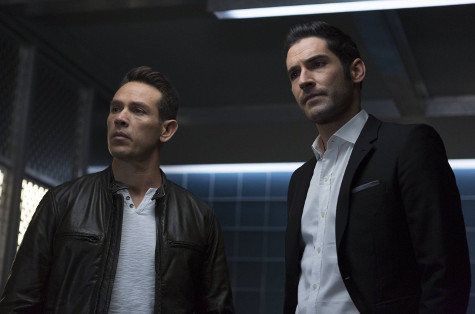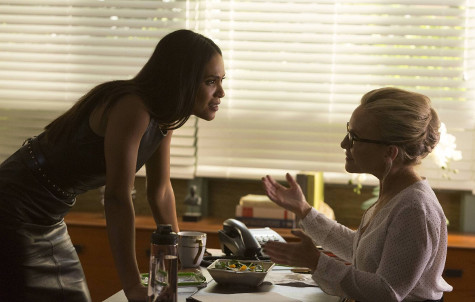
The Lucifer hiatus has ended, and we can finally get back to our favorite devil. This episode is pretty low-key when it comes to the mythology, but we still have an opportunity to explore the episode’s theme of worthiness. Specifically, we’ll look at where humanity fits in with angels, demons, and the divine.
For a while, Mum has been nursing a chip on her shoulder regarding humanity, eager to destroy the whole lot of them and blaming them for the disruption of her family. And now, even when she’s found that there are some things enjoyable about them (sex and Italian espressos), she continues to demean them.
We know that Lucifer has a liking for humanity—this episode was no exception as we see his bevy of lovers—but he is alone in this among his family and supernatural associates. Amenadiel believed that humanity was not meant to know certain things about the divine, but he at least regards humans as worth his time to associate with—especially Linda.
While Linda and Amenadiel don’t have a session together, Maze and Linda do—at least an informal one during lunch. Maze has never cared much about humanity, which is understandable since it was her job to punish them for their sins. However, in a moment where Linda is trying to compliment her for being “more human than a lot of people,” Maze immediately reacts hostilely with a “Take that back.” Linda’s attempt to remedy the situation with “you’re a good friend and a great person” throws salt on the wound.
Maze gives no reason as to why, but it’s clear that she considers herself different from humanity. And while she’s willing to have friends among humanity, she believes that to be called human is an insult.

The Bible is very quiet as to reasons for this. Both angels and demons have very little exploration of their characters and motivations. Even the book of Job, which reveals Satan as a tester of humanity, does not go into the why of it all. For a peek at the why, we have to turn to a book excluded from the Bible, The Life of Adam and Eve.
In The Life of Adam and Eve, Lucifer and Adam have a confrontation where Lucifer states he “will not worship him who is lower and posterior to me. I am prior to that creature. Before he was made, I had already been made. He ought to worship me.” Clearly, this Lucifer has a chip on his shoulder, believing himself to be superior to humanity, much as Maze does. Furthermore, God “sent [Lucifer] forth with my angels from our glory. On account of [Adam] we were expelled.” It’s easy to see there could be some resentment among those following Lucifer regarding humanity.
Aside from Lucifer, every angel, demon, and divine being brought into the show so far treats humanity as beneath them. It’s easy to surmise that Mum, as a divine being, believes herself far above humanity—even though she is finding reasons to appreciate them in limited ways. God is mute on the subject—which is his M.O. if we believe Amenadiel and Uriel. But we have to ask, what is special about humanity?
Again, we look to Maze for the beginnings of an answer. She is proud of what she and Dan did with Perry Smith, the man who killed Chloe’s father. From the beginning of the episode, she’s celebrating his death in front of both Chloe and Dan. She doesn’t understand Chloe’s insistence that “whoever did this is no better than he was.” Likewise, Dan is ashamed of what they did. He is suffering the weight of it, trying to rationalize it as “giving karmic justice a nudge,” which is beyond Maze’s comprehension since she viewed it as “a righteous kill.” These rejections of her actions are what drive her to visit Linda in the first place.
Lucifer suffers his own rejection when the “bevvy of exes singing [his] praises” credit him as giving them “the best night of [their] life,” yet it is a shallow experience as “it was just sex” with no further meaning. In Lucifer’s own words, “none of them cared enough about me to murder,” which is a hard realization for him.
The hierarchy established by the angels, demons, and mum are largely about the physical aspects of humanity and the things that they cannot do. What sets humanity apart from them, though, is the emotional complexity. It is only after coming to earth and being among humans that Amenadiel began to lose his way in the world that is no longer black and white.
Maze suffers through the same struggle, as her world was nothing more than the punishment of evil—an equally simple look at morality. In her world, Smith deserved to suffer, and did, so she did the right thing. Despite her repeating what Linda said about her own self-worth, she is far from understanding the complex morality of humans.
Lucifer, however, “had an epiphany, of sorts” by the end of the episode, realizing that Chloe “is selfless to a nauseating degree. [She] always put [her] daughter first, even though the ungrateful urchin does nothing to contribute to the rent. So [she] deserve someone worthy of that grace…. And I’m not worth it.” This realization that Chloe is better than he is sets Lucifer far apart from the rest of his family and Maze, and it will be interesting to see how it develops, especially since Amenadiel and Mum are attempting to push them together in order to regain heaven.
Read about the mythology of Episode 10: “Quid Pro Ho”!
Andy Adams is an adjunct professor of English at various colleges in the Phoenix area. He has an affectation for fedoras as they complement his villainous goatee. He’s been known to poke his head onto Twitter @A3Writer, but he’s never been big into birds. He blogs at A3writer.comabout writing, teaching, and the conquest of fictional worlds—they’re more fun than the real world.
Read all posts by Andy Adams for Criminal Element.
